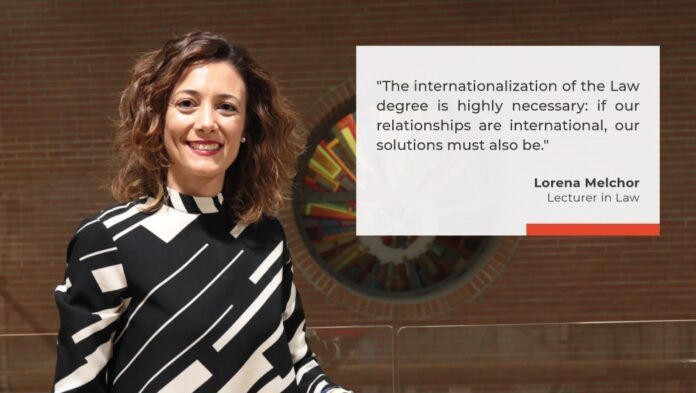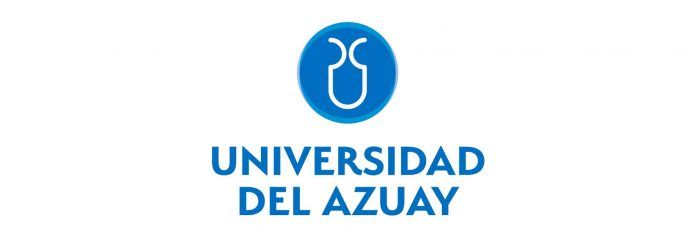This interview was to be all about out the COIL module for Law, but we came away from it having learnt about much more than we were expecting. This included teaching innovation projects, student-produced videos aimed at raising awareness about violence suffered by women, and new technology transforming law work. The lecturer Lorena Melchor talked to us about a whole range of different initiatives which reflect her teaching style: friendly, open-minded, and, above all, focused on transmitting values.
These values include internationalization, social responsibility and teamwork – common currency at the Faculty. It may well be worth keeping an eye out for the careers and future projects of her students, who study Law and other degrees.
But, for the moment, let’s concentrate on COIL and its use in comparative law – the next step for the internationalization of the Law degree.

Lorena, can you give us a basic idea of what comparative law is? In what year do students work on this, what are the objectives and what can students take from it?
Comparative law can be defined as a discipline or technique with which we can compare the solutions that different legal systems adopt for the same problem. In other words, it’s about considering how a particular country deals with and seeks to resolve a problem through the law. In this way, comparative law enables us to see the differences and similarities between different legal systems.
Regarding our objectives, it’s a clear opportunity for students to expand their legal knowledge. It enables them to enhance their knowledge of Spanish law and to learn about the law in other parts of the world. By doing that, they can identify what the strengths and weakness are of those same legal systems. It also helps them to gain greater knowledge of jurisprudence, as this is a way in which one can become acquainted with international legal concepts and terminology.
“The internationalization of the Law degree is essential as we’re gradually moving towards a situation in which we need coordinated global actions and solutions.”
Finally, we mustn’t forget that the comparative law approach is used by legislators when they need to seek out solutions for new situations. It’s about looking at how they do things elsewhere first, so that one can start legislating here afterwards. In short, it’s a way of looking at things which can benefit students in many ways.
Why did you choose a comparative law case as the first implementation of a COIL project for this degree?
The module forms part of a practical training course called Prácticas Integradas, which is taught in the fourth year of the degree in Law. By this stage, after years on the degree, we know that the students already have in-depth knowledge in a number of areas. And so the course is about the practical resolution of cases in all areas of law: tax law, criminal law, administrative law, etc.
For the COIL module, we want students to resolve a comparative law case, specifically in the administrative area. It’s particularly interesting because COIL enables us to get in touch with law students in other countries in order to examine what legislation is applicable there in such a case. The case to be considered concerns state liability, and we’re going to consider this issue through the prisms of the Spanish and Ecuadorian legal systems.
Spain, Ecuador and Comparative Law
So, the partner you’ve chosen for this initiative is a university in Ecuador, Universidad del Azuay. Was there any prior link between the universities or does the relationship only exist because of this project?
This COIL project is what has enabled us to create this partnership with them. As a lawyer, I specialize in the area of administrative law and last year I taught the course Administraciones Públicas (“government agencies”) on the Bachelor’s Degree in Political Science / International Relations. There were a lot of Erasmus+ students on that course who came from Latin America, and they’re the ones I spoke to first. I asked them whether they knew anyone at their universities who might be interested in taking part in this educational initiative. So, in the case of Universidad del Azuay, everything has happened because of the link with an Erasmus+ student.

What does the COIL module involve? How will the students work together, in general?
The other lecturer and I have prepared a real and practical case from Ecuador. The Ecuadorian legal system has its own legal solution, which is different from what the solution would be here. What we want is to create mixed teams of students from both universities and for them to work together on resolving the case. By doing that, we’ll be able to see what the similarities and differences are between the two countries and think about which solution is better, and which provides greater protection for citizens and for government agencies.
Apart from enhancing our students’ technical knowledge, we also want to facilitate cultural and social exchange between the students. Our work has to go beyond the purely legal issues so that real personal contact can take place. Who knows? Maybe we could set up an exchange programme in the future and the students could meet in person! For me, that would be a great success for the COIL for Law project. I strongly believe that, in addition to legal knowledge, we have to convey a set of values and principles to our students.
For this collaboration, we’ll use a platform called Google Classroom, uploading all the material there. The first class will be a joint event with our colleagues in Ecuador, taking place via a real-time connection. Later, the students will be able to contact each other however they want, but then the final presentation will take place on the same online platform.
“We want to train our students in the use of the legal tech that they will need in their careers.”
We know how much we depend on technology in this case and that there are some challenges to overcome, such as the time zone difference. However, with real engagement and motivation, these obstacles can be overcome. And any problems can be resolved, so that everyone can work together easily.
The internationalization of law studies
How can we make internationalization a part of a degree like Law? Is it more difficult than for other degrees, due to the nature of what it involves?
Today there are more and more problems for which an international response is necessary. For example, the protection of the environment or the problems related to the Internet. We have to realize that our world is increasingly global, and so our problems are too. The law cannot be oblivious to this and not provide solutions.
I think it’s very important that students have, from the start, that international contact with other countries. The internationalization of the Law degree is essential as we’re gradually moving towards a situation in which we need coordinated global actions and solutions.
Internationalizing a law degree is not such a difficult thing and, in fact, I think it is something which is highly necessary. That’s why I think that it’s great that the faculty offers initiatives like COIL. We cannot, professionally, do anything other than open ourselves up to the world: we live in the European Union, and this already imposes obligations on us that prevent us from closing ourselves in behind our borders. And with no borders restricting career mobility, with all the possibilities that online work opens up, with clients who are ever more geographically dispersed, we need to know what the international regulations are for certain matters, what the law is in other countries.

In the past, perhaps the practice of law was more traditional in nature, more focused only on local or national issues. But this is no longer the case: if our relationships are international, our solutions must also be.
The Faculty of Law, Business and Political Science is committed to making new approaches and innovative initiatives a part of its degrees. In addition to the COIL modules, the concept of legal tech is beginning to gain importance in the Law degree: what can Law students gain from these Faculty-led initiatives?
Legal tech is an extremely interesting concept for the law profession. Using technology in the legal field enables lawyers to save costs and time and access information easily. We can consult laws instantly, review amendments, search through case law – legal tech really opens up many possibilities! At our faculty, the lecturers are already receiving training to help them make legal tech a part of their courses. And a Legal Tech Lab has also been set up to enable lecturers and students to take part in simulations: we want to train our students in the use of those technological tools that they will need later when practising law.
When you talk to Lorena Melchor, you know that you’re talking to a person committed who is committed to the values that our university stands for: internationalization, and a vocation for service and social responsibility. Thank you very much for sharing these values with us!







